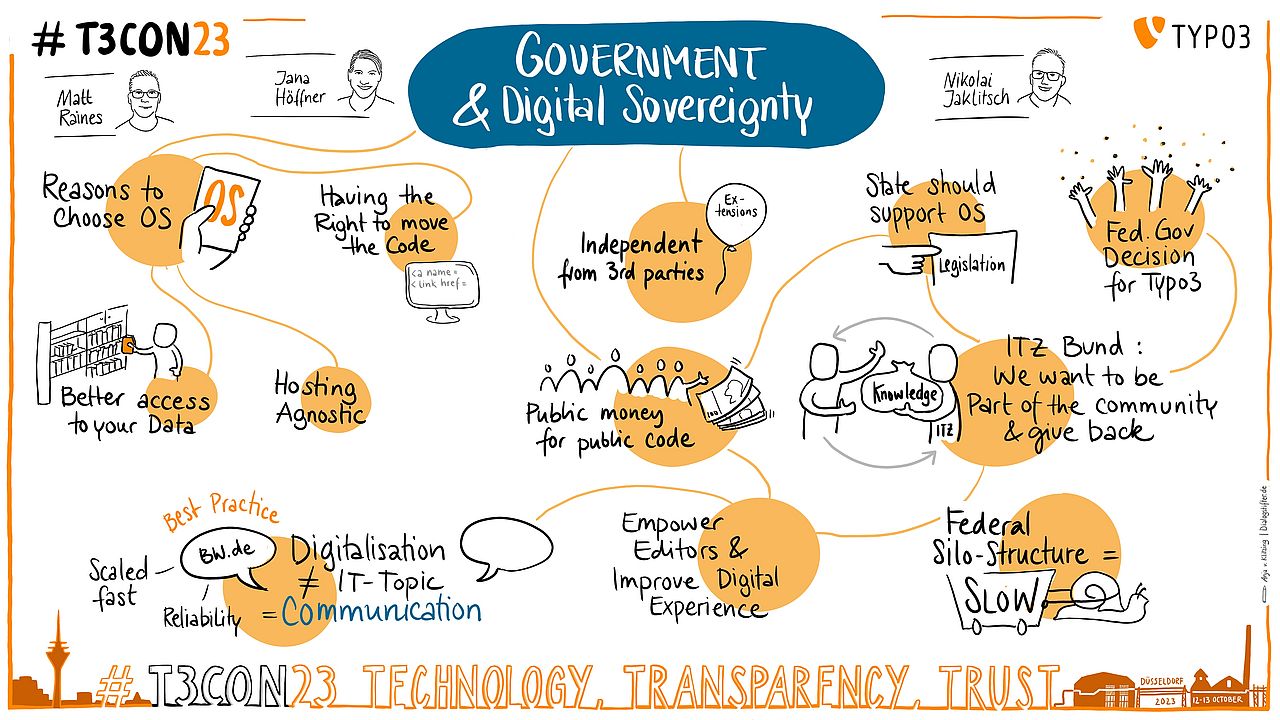
T3CON23 Recap—Panel Discussion on Government and Digital Sovereignty
A highlight of T3CON23 was the panel discussion on Government and Digital Sovereignty. It explored the practical applications and challenges of maintaining digital sovereignty in the public sector and was described as “one of the best talks” of the conference.
The German government’s decision to base its Site Builder software on TYPO3 was a resounding backdrop, confirming the value open-source solutions can offer.
The panelists brought with them many years of experience working on important government website projects:
- Developer Matt Raines, of Prater Raines, used TYPO3 CMS to set up over 300 websites for the UK’s Liberal Democrat party.
- Jana Höffner, from the ressourcenmangel agency, advises public sector clients on Citizen Experience and was responsible for online communication in the German state of Baden-Württemberg.
- Civil servant Nikolai Jaklitsch works for the German Federal Information Technology Centre, ITZBund, on the country’s digitalization strategy.
Read on for a full recap, or catch up on what else you missed at T3CON23.
Implementing open-source systems in the UK

Copyright: Markus Luigs
Matt Raines has extensive experience building applications for UK political parties and campaigning organizations using TYPO3 and other open source technologies. For over 20 years, his company has delivered successful projects leveraging open source.
Most recently, the company rebuilt the entire web portfolio of the Liberal Democrat party in the UK. They chose TYPO3 because it was enterprise-ready, could handle hosting on different platforms, and was already used by large federated organizations in Europe. As an active open-source community member, Raines has helped organize PHP user groups and conferences for many years.
"If you are spending public money building things, then those resources should go back to the public."
Matt Raines
Raines emphasized that open source helps government agencies spend funds in a way that benefits the public: “It’s about government having power over its own data, essentially. If you are spending public money building things, then those resources should go back to the public. With open source, you can also build a community around that of local experts and build talent in your country to develop the technologies that you're using.”
The UK national government has increasingly embraced open data and built capable in-house open-source platforms in recent years. However, he warned there are risks in building completely new systems and not utilizing established open-source projects.
“Open source is the only way to guarantee digital sovereignty, foster local talent, and create a digital economy,” Raines wrote in his own summary of the discussion.
Listen to our podcast 'Inside TYPO3,' where host Tom Warwick speaks to panelist Matt Raines about his experience at T3CON23, among other topics.

Copyright: Markus Luigs
Driving digital transformation in Germany’s public sector
Jana Höffner provided an inside look at the digitalization efforts within Germany’s complex governmental landscape. She explained that the autonomy of federal, state, and municipal governments can create silos and competing interests that hinder alignment on unified national digital strategies and platforms. “One big challenge was to put the ministries all together, with the same mindset,” she remarked.
“We can see that there is an improvement and a change of mind in implementing open source."
Jana Höffner
Ministries previously used a proprietary government website builder, but it was difficult to make it work with their technical environments and delivery models.
Höffner and her team capitalized on the momentum created by a change in state government to overhaul Baden-Württemberg’s official websites, using TYPO3. This removed the lock-in of the proprietary solution and meant becoming an active part of the open-source community — not just benefiting from the community’s knowledge and wisdom, but also contributing back to it.
The state’s move heralded the recent decision that all German ministries should adopt a shared version of the TYPO3-based Government Site Builder software, GSB 11.
Höffner underscored the importance of open source for government IT, allowing investment in feature development over license fees. The advantages were so significant that Höffner even suggests it should be stipulated as a requirement in government procurement contracts.
“I think it would make sense to put open source into the law, for example, when you have procurement processes,” she said. “But it’s hard and it takes a lot of time. And it takes a lot of pressure to change regulations.” Nonetheless, there is cause for hope: “We can see that there is an improvement and a change of mind. Maybe it will still take a couple of years.”
Freeing resources for better communication

Copyright: Markus Luigs
Nikolai Jaklitsch offered his perspective from the German Federal Information Technology Centre, ITZBund.
Jaklitsch explained that adopting open-source solutions allows invested public funds to benefit society, rather than paying proprietary software license fees. He highlighted the cost-effectiveness of these solutions: “We save a lot of money. And the money that we spend or use — the public money — goes back to the public and to society, if we force open source solutions.”
"TYPO3 has such a big robust repository, and extensions for improving communication. (...) So you have more opportunities."
Nikolai Jaklitsch
Jaklitsch stressed the importance of using savings eliminated from license fees to enhance public services. He advocated for investing in skilled online editors and improving accessibility.
“The main product we sell on a governmental webpage is trust,” Jaklitsch said, explaining that they designed state government websites in Germany to focus on accessible, engaging communication, not self-promotion. During the Covid-19 pandemic, for example, the federal government website was the top source for official updates — and its communication needed to be as direct and clear as possible.
On the topic of TYPO3, Jaklitsch also emphasized the importance of the open-source community for government projects in terms of the sheer number of contributions that are available: “TYPO3 has such a big robust repository, and extensions for improving communication. And you’re not relying on one agency, like if you have a proprietary system. If you have an agency, and you say, ‘I want this feature’, and then they build it — if it sucks, it sucks. With TYPO3, you might have five extensions for one function, and then you can see that one works better for your purposes than others. So you have more opportunities.”

Copyright: Markus Luigs
Germany’s choice for government websites delights
TYPO3 community members in attendance were delighted to hear the panelists discuss how German government ministries have adopted the CMS.
“As the German government has firmly chosen TYPO3 CMS to power the Government Site Builder (GSB) for all its ministries, [community] ties will surely grow even stronger,” wrote Arxia CEO Daniel Homorodean.
Business coach Janus Boye was equally optimistic: “Open source is the way forward and with a new strategy, a commitment from the government down here that the product will be the future basis for the Government Website Builder, and a strong community, TYPO3 seems to be on a good course.”






